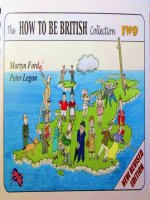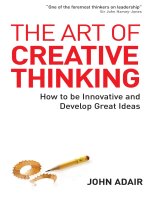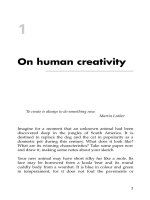The how to be british collection
Bạn đang xem bản rút gọn của tài liệu. Xem và tải ngay bản đầy đủ của tài liệu tại đây (4.82 MB, 69 trang )
^They
HOW TO BE BRITISH
CoU^ctLor\/
The How To Be British Collection
Martyn Ford
Peter Legon
The How To Be British Collection
Published by Lee Gone Publications, 11 Bowen Court, 31-35 The Drive, Hove, BN3 3JF, GB
First published 2003
Reprinted (twice) 2003
Reprinted (three) 2004
Reprinted (twice) 2005
Reprinted (twice) 2006
Reprinted (twice) 2007
Reprinted (twice) 2008
Reprinted 2009
Reprinted 2010
© Martyn Ford, Peter Legon 2003. All rights reserved.
Artwork by Martyn Ford.
ISBN 9780952287018
Printed in China.
All rights reserved; no part of this publication may be reproduced, stored in a retrieval
system, or transmitted in any form or by any means, electronic, mechanical, photocopying,
recording or otherwise, without the prior written permission of the publishers.
f o r Ja n e a n d N igel Taylor
1 True Brit
How do you do? Pleased to meet you. If you are a visitor to our country I expect by now you
have realized why we call it Great Britain: our long and glorious history; the unspoilt beauty
of our landscape; the rich variety of our weather, not to mention our unrivalled achievements in
cricket and football. Then there are our cherished traditions: afternoon tea at four, roast beef on
Sunday, and warm beer until 11pm. And there’s us, with our old-world courtesy and tolerance.
Oh, and our sense of humour. I mustn’t forget that. We do like a good laugh!
As for me, well, I’m so many feet and inches tall, and I weigh so many stones, pounds and
ounces. My petrol comes in gallons and my milk in pints — from a milkman. I pay for them,
of course, in pounds sterling. My home is my castle and I ‘Do-it-M yself’. I only hope I live to
pay off the mortgage on it. My garden is my recreation and a sanctuary to many endangered
species, not least of all myself!
Expressions to learn
Well done! You deserved to win.
Avoid saying
What is that in metres/kilos/litres?
You can tell I'm British because...
I live in the p a st
I never refuse a drink
I don't care
what people think
I don't speak a
_____________________ foreign language
I'm a different person
when the sun's out
I'm lost without
my dog
I'm not bothered
about a bit o f dust
I wouldn't live
anywhere else!
2 Arrival
You can see the visitors arriving at British airports, their wide eyes and flushed faces expressing
the mingled wonder and apprehension they feel. T hey’ve made it! T hey’re actually here, in
this fairy tale land of knights and wizards, princes and pop idols, the birthplace o f the industrial
revolution, computers, human rights, pork scratchings, evolution, lawn tennis, parliament and
punk. Some of the new arrivals look a bit disorientated and confused, which is only natural as
everything here is so different and, well, so much better! But life here can take a bit of getting
used to: driving on the left, being ruled by a Queen, pouring gravy or custard over everything
and of course getting around in English the whole time! One thing the visitor soon discovers:
although Brits come in many different shapes and sizes we are united by one very important
characteristic: we are all waiting for the weather to ‘buck up’.
Expressions to learn
Hello. You must be Big Ben. I ’ve heard a lot about you.
Avoid saying
Tell me — why do you have a royal family?
y H
p
a
t t
f o
a
)J The
weather
m
The
countryside
The food
and the
language
W otcha.mate!
How are ue
diddling"?
Bloominqbrqss
monkey weather
innit, eh? Say,
how are uou .fixed
fo r th e odd bob
or two...?
3
a.
m
h a v i n g
t i m e
h c t c !
3 The Telephone Box
Before mobile phones made everything so easy, the public telephone box was an important
focus for community life. People of all types and classes would form an orderly queue outside
its red iron door, clutching their pennies and waiting patiently for their turn to be linked up to the
great wide world. For a shy people like the British it was an opportunity to meet and exchange
news and gossip with neighbours and to get some fresh air. And w hat’s more, once you were
inside that box everything you said was private. Everybody uses mobiles nowadays, but talking
loudly in public places with unseen faces, about personal feelings or secret dealings...well it’s
not something our true Brit feels comfortable about! Now there's a new generation of phone
boxes which can link you up to the Internet, receive e-mails, take payment by phone card or
credit card. Impressive, perhaps, but where is the romance?
Expressions to learn
Just popping out to the phone box — I ’ll be back tomorrow night.
Avoid saying
It’s me. I ’m on the train.
r
In the good old days, the traditional British TELEPHONE BOX was a national symbol,
providing a focus for community, a lifeline to the great wide world...
I'm married nt^ ^ ucn£ i^ i?V es
An
Manaaer a t the
& & & & & ■
4 Dress Sense
A city street in mainland Britain. It’s 11.15pm on a cold Friday night in the dead of winter. Two
young women in crop tops showing their bare waists and shoulders, and mini skirts with no
tights underneath are strolling along arm in arm. “ ’Elio, darling!” they shout, “where you from
then?” And they run off down the road screaming with laughter. “Good heavens!” wonders the
visitor, “aren’t they cold?” This is an example of our famous British toughness. On the other
hand, in summer the same visitor may observe Brits sitting on the beach wearing jackets and
pullovers with long woollen socks under their sandals. The important thing to remember is
that the British dress to please themselves and to show their independence of fashion, weather,
social convention and colour theory. For many foreigners visiting Britain it’s a welcome change
to be able to dress without having to worry if their clothes are the wrong size, or don’t match,
or are torn, or inside out, or show off their fat legs.
Expressions to learn
There’s no need to dress up.
Oh, it’s just an old thing I dug out.
Avoid saying
Orange and purple don’t go.
Skirt? What skirt?
Mm. The B ritish are
o b v io u s ly w arm er
people th a n I th o u g h t
And I say you're not properly dressed!
5 Tea
In most countries tea is a very disappointing experience: a teabag dropped into a glass of hot
water with the string still attached. In Britain, by contrast, tea is not only a wonderful drink, but
also a light but substantial meal of sandwiches, biscuits and cake, and an important ceremony
of our national life.
It was of course the British who discovered the pleasant and restorative effects of this famous
infusion. One day a gentleman called Earl Grey was walking with a friend through India when
suddenly, in the middle distance, he noticed a small and undistinguished-looking shrub covered
with greenish leaves. The sun was hot and both men were feeling very thirsty. In a moment of
visionary inspiration, Earl Grey turned to his companion: “I say, Carstairs — do you see that
undistinguished-looking bush or shrub over there? Now that would make a nice cup of tea!”
Thus wras born the East India Tea Company and the habit of drinking this refreshing beverage
in small porcelain cups, which has since spread throughout the world.
Expressions to learn
I ’m gasping for a cuppa!
One lump or two?
Avoid saying
Actually, I ’d prefer coffee.
6 Complaining
In order to be British, or at any rate to pass unnoticed in British society, the visitor must learn
not to make a fuss. A fuss is something that the true Brit cannot stand. It is nearly as bad as a
scene , and in the same category as drawing attention to yourself.
A clear example of fu ss is complaining about poor service, for example in a hotel, shop or
restaurant. The true Brit does not do this. “Just think for a moment,” says the Brit, “would
you like to do their job?” If the receptionist ignores you, or the hairdresser blows smoke in
your face, if the soup is cold or the taxi driver overcharges — say nothing. Who knows what
disappointments, what secret sadness their lives might contain. You may purse your lips or grit
your teeth; you may raise one eyebrow quizzically, but don't complain. You can always write to
the local newspaper when you get home!
Expressions to learn
Keep your voice down, they’ll hear you!
I’m sure they’re doing their best, dear.
Avoid saying
I demand to see the manager!
7 Politeness
In order to be a popular guest, and to make a good impression on his British hosts, the foreign
visitor needs to learn how to apologise. In the street. On the bus. At the hairdresser’s. In the
bedroom. Going out and coming in. Sorry is one of the most important words in the vocabulary
of any true Brit. And it’s a word which should be always on the lips of any foreigner moving
amongst us. Sorry prepares a path, excuses faults, calms nerves and wipes the slate clean so
that we can all be jolly together and not get upset. Together with ‘sorry’, the words ‘Please’ and
‘Thank you’ are perhaps the most useful in any foreign visitor’s lexicon. ‘Please’ belongs to a
family of words that includes pleasant, pleasure and pleasing , which is further proof that it’s
nice to be polite. ‘Thank’ comes from the Old English thonc , which has the same root as the
word think. Thus, being polite is the same as being thoughtful!
Expressions to learn
After you.
Allow me.
Avoid saying
...w hat you really think.
G et
around in
|J l |r p
E /l
f
f C .H
Lesson Twenty-Five
H ow tO be P olite
v^ould mind helping me
a moment, as long°as
$t's no trouble,ofcourse
8 Speak Slowly
If you find it difficult to follow connected English speech, d on’t worry. We British are well
aware of the complexities of our language and only too happy to simplify our speech for the
benefit of the ‘challenged’ foreign user. Here are some useful phrases to learn. Slip them into
the conversation whenever you’re in trouble!
Sorry, what did you say?
Could you repeat that, please?
Pardon?
What?
Eh?
Huh?
I ’m not with you.
Come again.
I haven’t a clue what you’re on about.
What language are you speaking?
Could you try drawing a picture?
My English When I Arrived Here
SpeaK slouilu,
I don’t can
good understand
My English Now
(£5000 later)
Speak slowlu,
p l ease,
I don’t can
qood understand/
J
9 Pronunciation
There’s no point having perfect grammar and a vast vocabulary if no one can understand what
you're saying. If you are worried about your pronunciation, practise these useful sentences at
home alone.
Mother and Father left Rotherham last Thursday, wandered hither and thither, then thumbed a
lift to Thirsk.
Larry rarely allows Lily and Rory a lift in the lorry, but Laura regularly lets Roland lie languidly
on her lilo.
While Archie shimmied with Sheila, Sacha cha cha cha-ed with Shirley.
One windy Wednesday, wealthy widow Wendy Williams went to visit Westminster vet Victoria
Vince to view her lovely violets.
Get
r \ ] n
T C U
around in Ju IN V j L l u l l
Lesson Seventy-two
How to Pronounce the th sound
PLACE TIP OF TONGUE
BEHIND TOP TEETH
BREATHE OUT
RETRACT TONGUE
VIBRATE AIR BEHIND
TONGUE AND SAY:
"The Smiths wear thin clothes
throughout the winter months "
CONSULT DENTIST
10 Top Tongue
Why is English the w orld’s ‘dream ’ language? Well, for one thing our grammar is so sensible,
dependable and straightforward. Most languages have two or three forms for you , depending
on status, intimacy, and so on. English, democratically, has only one. Also English has done
away with all that unnecessary fuss over nouns and adjectives: masculine, feminine, singular,
plural — not to mention nominative, accusative, dative, and so on. Furthermore, English has
the Present Perfect Tense which, as its name implies, is quite simply the best tense in the
world. English has lots of prepositions , and these are a great help in global positioning systems
and personal orientation programmes. There are some unfortunate languages in the world that
don’t have any prepositions at all, which can make it very difficult to find your trousers in the
morning.
Another advantage of English is that it has a vast vocabulary. We have lots and lots of synonyms.
For example, we have over 50 words meaning mad , at least 80 which mean drunk , and 231
adjectives to describe the weather. What a valuable resource for any civilisation!
Expressions to learn
Is she in the toilet or on the toilet?
Avoid saying
You don’t have a word for it in English.
How do I know i f
m y English is J lu e n t ?
To beor not tole -
That is the question L
Whether tisj.obler
in the minds
/o u can tell you areJluent
when you dream in English
ms a
NEXT DAY.
Guess w hat —1 dreamt
in English la s t n ig h t!
I
Hie only problem is
I didn’t understand
a w ord of it !
M flr^
11 Sense o f Humour
What makes the British laugh? Can a foreigner ever learn to enjoy and to share the British
sense of humour? It’s not easy and may take some time, but it can be done. The eager visitor
should first become acquainted with the following and their place in our national collective
consciousness: toilets; trousers (when they fall down); restaurant diners with flies in their soup;
little men (usually called Willy) with very large wives; doctors and patients with strange things
wrong with them.
Understanding and telling jokes is an important part of social life in this country, and one that
can cause frustration and embarrassment to the foreign visitor. Slowly build up your skills in
this area. Practise laughing at a few of the best known British jokes; start with very simple
examples, and as you gain in confidence, try some even simpler ones. Here is an example to
start you off.
PATIENT: Doctor. Every time I have a cup o f tea, I get a stabbing pain
in my eye.
DOCTOR: Well, try taking the spoon out.
Expressions to learn
Have you heard the one about...
Avoid saying
Oh dear — I’ve forgotten the punchline.









